When choosing the best energy-efficient appliances, you'll want to focus on several key factors. Look for the Energy Star rating, which indicates superior efficiency. Check the annual energy consumption in kilowatt-hours (kWh) to estimate potential savings. Consider the appliance's size and capacity to match your needs. Advanced features like smart home integration and adaptive power management can enhance efficiency. While energy-efficient models may cost more upfront, they often provide long-term savings and durability. Don't forget to compare specific performance metrics for each appliance type. By weighing these factors, you'll be well-equipped to make an informed decision on your next purchase.
Energy Star Rating
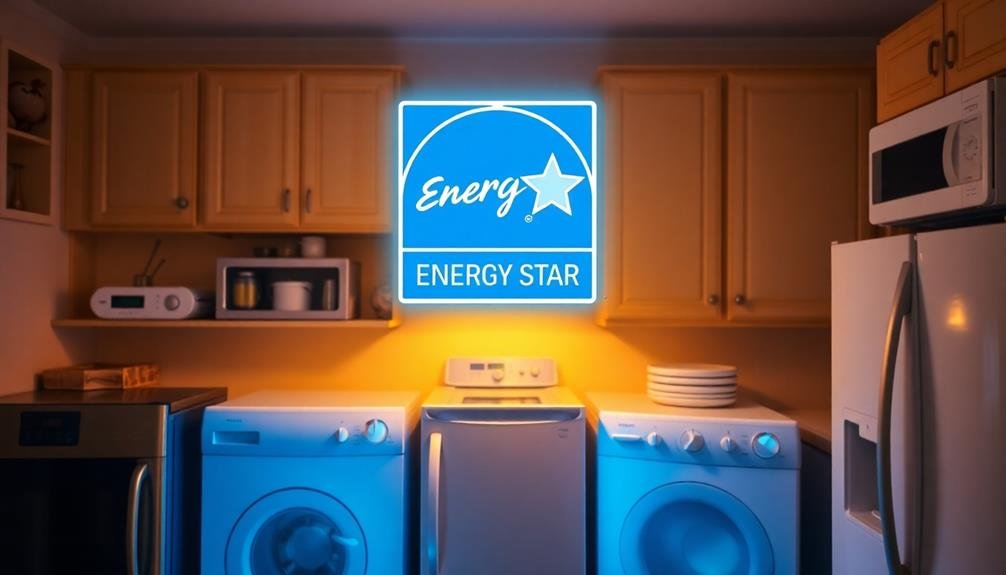
The Energy Star rating is a widely recognized symbol of energy efficiency. When you're shopping for appliances, you'll often see this blue label on products that meet strict energy efficiency guidelines set by the U.S. Environmental Protection Agency and the Department of Energy.
These ratings help you identify appliances that use less energy, save money on utility bills, and reduce your environmental impact.
To earn the Energy Star certification, appliances must undergo rigorous testing and meet specific criteria. They're typically 10-50% more efficient than standard models.
When you choose an Energy Star rated appliance, you're not only reducing your carbon footprint but also saving on long-term operating costs.
The Energy Star label provides valuable information about an appliance's energy consumption and potential savings.
You'll find details on annual energy use, estimated yearly operating costs, and comparisons to similar models.
This data allows you to make informed decisions about which appliances will be most cost-effective and energy-efficient for your home.
Annual Energy Consumption
Understanding annual energy consumption is essential when evaluating appliance efficiency. This measure tells you how much energy an appliance uses over a year, typically expressed in kilowatt-hours (kWh). When you're shopping for energy-efficient appliances, you'll often find this information on the EnergyGuide label.
To interpret annual energy consumption, compare it across similar models. Lower numbers indicate more efficient appliances. However, don't forget to take into account your usage patterns. A highly efficient washing machine mightn't save you much if you rarely do laundry.
You can estimate your potential savings by multiplying the difference in annual energy consumption between two models by your electricity rate. This calculation will give you a rough idea of yearly cost savings.
Remember that larger appliances generally consume more energy, so it's important to choose the right size for your needs. Don't be tempted by a massive refrigerator if you don't need that much space – it'll likely use more energy than a smaller model.
Lastly, reflect on how the appliance's energy consumption aligns with your household's overall energy goals and budget. This approach will help you make the most cost-effective and environmentally friendly choice.
Size and Capacity
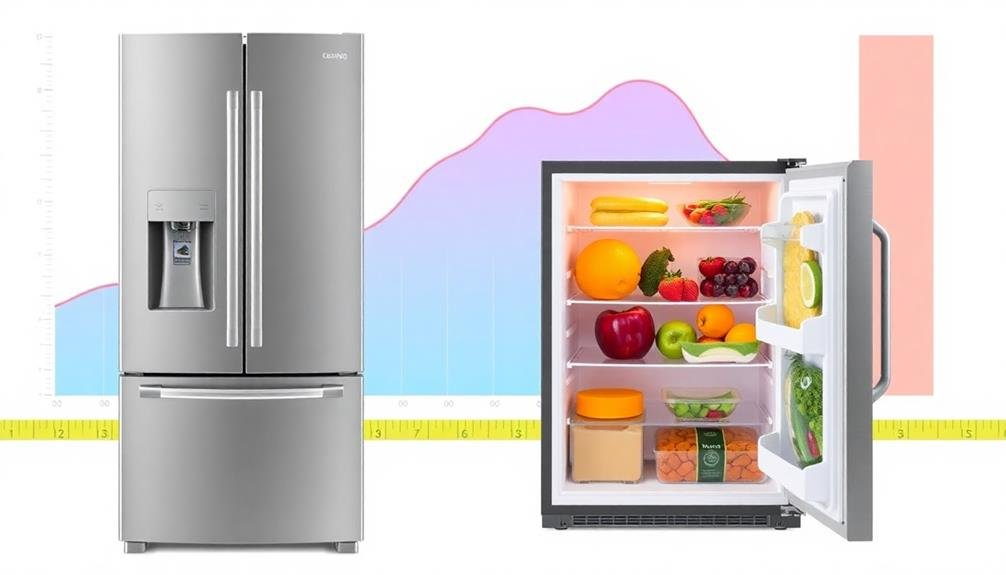
When choosing energy-efficient appliances, size and capacity play an essential role in both performance and energy consumption. You'll want to select appliances that fit your specific needs without being oversized, as larger units typically use more energy.
For refrigerators, consider your household's food storage requirements. A fridge that's too big will waste energy cooling empty space, while one that's too small may lead to frequent shopping trips.
With washing machines, match the capacity to your typical laundry loads. Oversized washers use extra water and energy, even for small loads.
When it comes to air conditioners, proper sizing is vital. An undersized unit will struggle to cool your space efficiently, while an oversized one will cycle on and off frequently, wasting energy and failing to dehumidify properly.
Calculate your room's square footage and factor in ceiling height, insulation, and local climate to determine the right BTU rating.
For dishwashers, choose a model that accommodates your usual dish load. Some energy-efficient models have adjustable racks or specialized cycles for smaller loads, helping you save energy when you don't need the full capacity.
Advanced Technology Features
Advanced technology features in energy-efficient appliances can greatly boost your home's overall efficiency.
You'll find smart home integration allowing remote control and monitoring, while adaptive power management adjusts energy consumption based on usage patterns.
Precision sensors further optimize performance, ensuring your appliances use only the energy they need for each task.
Smart Home Integration
Smart home integration takes energy-efficient appliances to the next level. By connecting your appliances to your home's Wi-Fi network, you'll gain unprecedented control over their operation and energy consumption. You can monitor and adjust settings remotely using your smartphone or voice commands through virtual assistants like Alexa or Google Home.
Smart appliances can communicate with each other and your home's energy management system. This allows for ideal scheduling of energy-intensive tasks, such as running your dishwasher or washing machine during off-peak hours when electricity rates are lower.
Some smart refrigerators can even track their contents and suggest recipes based on what's inside, helping reduce food waste.
When choosing energy-efficient appliances with smart home integration, look for compatibility with your existing smart home ecosystem. Consider features like energy usage reports, automatic software updates, and the ability to integrate with renewable energy sources like solar panels.
Smart thermostats can learn your schedule and preferences, automatically adjusting your home's temperature to maximize comfort and energy savings.
Adaptive Power Management
Adaptive power management technology represents a considerable leap forward in energy-efficient appliances. This advanced feature allows your devices to intelligently adjust their power consumption based on usage patterns and environmental factors.
By continuously monitoring and enhancing energy usage, adaptive power management can greatly reduce your electricity bills and minimize your carbon footprint.
When shopping for energy-efficient appliances with adaptive power management, look for these key features:
- Real-time energy monitoring: Devices that track and display energy consumption in real-time, allowing you to make informed decisions about usage.
- Machine learning capabilities: Appliances that learn from your habits and automatically adjust settings for peak efficiency.
- Dynamic power scaling: The ability to reduce power consumption during periods of low demand or inactivity.
- Remote control and scheduling: Options to manage your appliances remotely or set schedules for peak efficiency.
Precision Sensors Technology
Precision sensors form the backbone of modern energy-efficient appliances, enabling unprecedented levels of control and enhancement. These advanced sensors can detect minute changes in temperature, humidity, and usage patterns, allowing your appliances to adjust their operation in real-time.
You'll find that refrigerators with precision sensors can maintain ideal cooling levels, adjusting compressor speed based on food load and door openings.
Washing machines equipped with these sensors can determine the exact amount of water and detergent needed for each load, reducing waste and energy consumption. In dishwashers, sensors detect the level of soiling on dishes, adjusting water temperature and cycle duration accordingly.
Smart thermostats use precision sensors to learn your habits and preferences, automatically adjusting your home's temperature for maximum comfort and efficiency.
Even your oven can benefit from this technology, with sensors ensuring precise temperature control and cooking times.
When shopping for energy-efficient appliances, look for models that incorporate multiple precision sensors. These devices won't only save you money on utility bills but also provide superior performance and convenience.
Initial Cost vs. Long-Term Savings
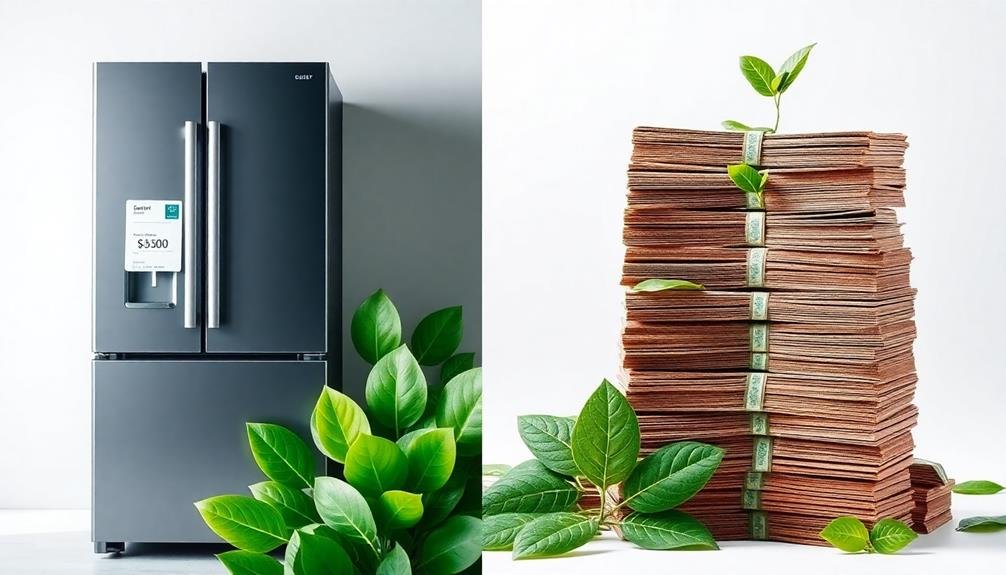
Despite their higher upfront costs, energy-efficient appliances offer substantial long-term savings. When you're considering purchasing new appliances, it's essential to look beyond the initial price tag and factor in the potential savings over the appliance's lifetime.
Energy-efficient models may cost more upfront, but they'll save you money on utility bills and often last longer than their less efficient counterparts.
To understand the true cost-benefit of energy-efficient appliances, consider these factors:
- Energy consumption: Compare the annual energy usage of different models to estimate your potential savings.
- Utility rates: Factor in your local electricity and water rates to calculate more accurate long-term savings.
- Lifespan: Energy-efficient appliances often have longer lifespans, reducing replacement costs.
- Rebates and incentives: Check for available government or utility company incentives that can offset the initial cost.
Lifespan and Durability
Energy-efficient appliances not only save you money on utility bills but also tend to have longer lifespans and greater durability. This improved longevity is often due to their higher-quality components and advanced technologies.
When you're shopping for energy-efficient appliances, consider their expected lifespan and durability alongside their energy ratings.
Look for appliances with robust warranties, as these often indicate the manufacturer's confidence in the product's longevity. Research customer reviews and reliability ratings from independent sources to get a sense of real-world performance.
Pay attention to the materials used in construction, such as stainless steel for refrigerators or porcelain-coated tubs for washing machines, which can contribute to increased durability.
Consider the appliance's maintenance requirements and how they might affect its lifespan. Some energy-efficient models may have features that reduce wear and tear, like self-cleaning ovens or frost-free refrigerators.
Remember that proper care and regular maintenance can greatly extend an appliance's life, regardless of its energy efficiency.
Specific Appliance Performance Metrics
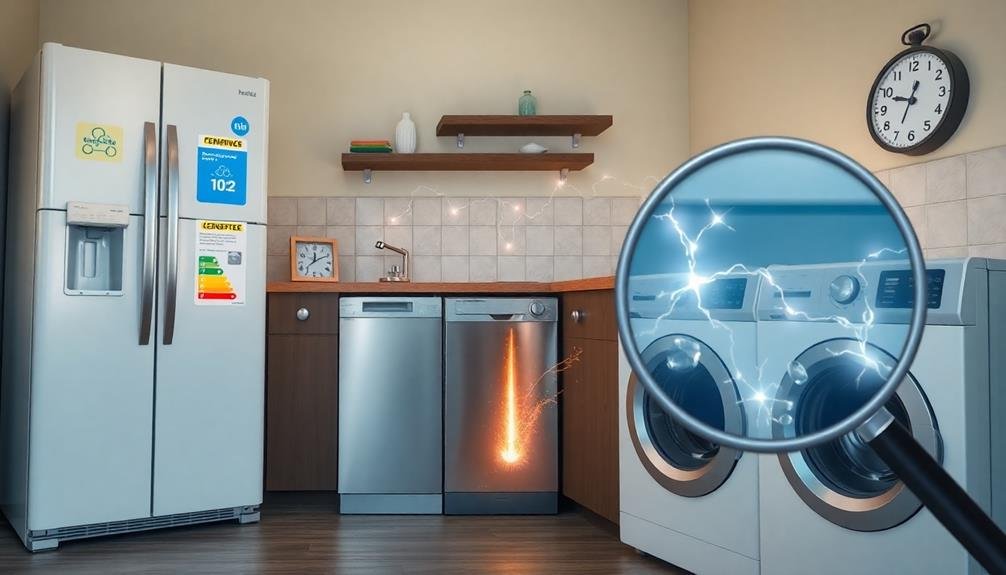
When evaluating energy-efficient appliances, it's crucial to understand specific performance metrics for each type of device. These metrics help you compare different models and make informed decisions based on their energy consumption and efficiency.
For refrigerators, you'll want to look at the Energy Star rating and annual energy consumption in kilowatt-hours.
Washing machines are evaluated based on their Modified Energy Factor (MEF) and Water Factor (WF), which measure energy and water efficiency, respectively.
Dishwashers are rated on their Energy Factor (EF), indicating how much energy is needed to wash a load of dishes.
When considering HVAC systems, pay attention to these key metrics:
- Seasonal Energy Efficiency Ratio (SEER) for air conditioners
- Heating Seasonal Performance Factor (HSPF) for heat pumps
- Annual Fuel Utilization Efficiency (AFUE) for furnaces
- Energy Efficiency Ratio (EER) for room air conditioners
Understanding these performance metrics will help you choose appliances that not only save energy but also meet your specific needs.
Remember to compare similar models and sizes to get an accurate picture of their relative efficiency.
Frequently Asked Questions
How Do Energy-Efficient Appliances Impact Home Resale Value?
Energy-efficient appliances can boost your home's resale value. They're attractive to buyers looking to save on utility bills. You'll likely see a higher return on investment and quicker sale when you upgrade to energy-efficient models.
Are There Tax Incentives for Purchasing Energy-Efficient Appliances?
Yes, you'll often find tax incentives for buying energy-efficient appliances. These can include federal tax credits, state rebates, and utility company incentives. Check with your local government and energy providers to see what's available in your area.
Can Energy-Efficient Appliances Be Integrated With Smart Home Systems?
Yes, you can integrate many energy-efficient appliances with smart home systems. They'll connect to your Wi-Fi, allowing you to control and monitor them remotely. This integration enhances their efficiency and gives you greater control over your home's energy use.
How Do Energy-Efficient Appliances Affect Homeowners Insurance Premiums?
You'll likely see a reduction in your homeowners insurance premiums when you install energy-efficient appliances. They're viewed as safer and more reliable, reducing the risk of fires or water damage. Some insurers offer specific discounts for these upgrades.
What Are the Environmental Impacts of Manufacturing Energy-Efficient Appliances?
You'll find that manufacturing energy-efficient appliances does have environmental impacts. They require resources and energy to produce, but their long-term benefits often outweigh these initial costs. You're still helping reduce overall energy consumption and emissions.
In Summary
You've learned about key factors that determine the best energy-efficient appliances. Remember to check the Energy Star rating, annual energy consumption, and size when shopping. Don't forget to evaluate advanced features, initial costs versus long-term savings, and the appliance's lifespan. Pay attention to specific performance metrics for each type of appliance. By weighing these factors, you'll make an informed decision that saves energy and money in the long run.

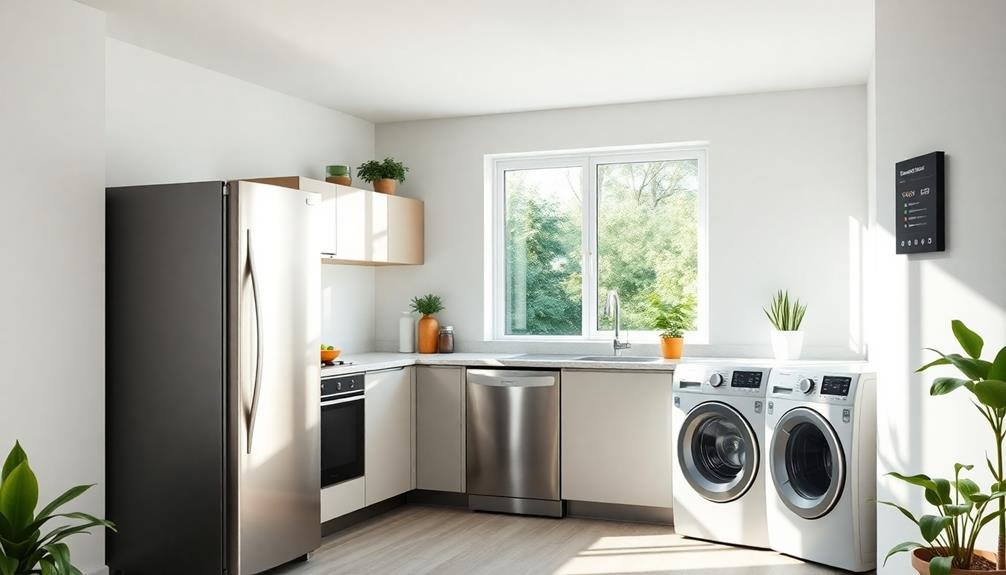

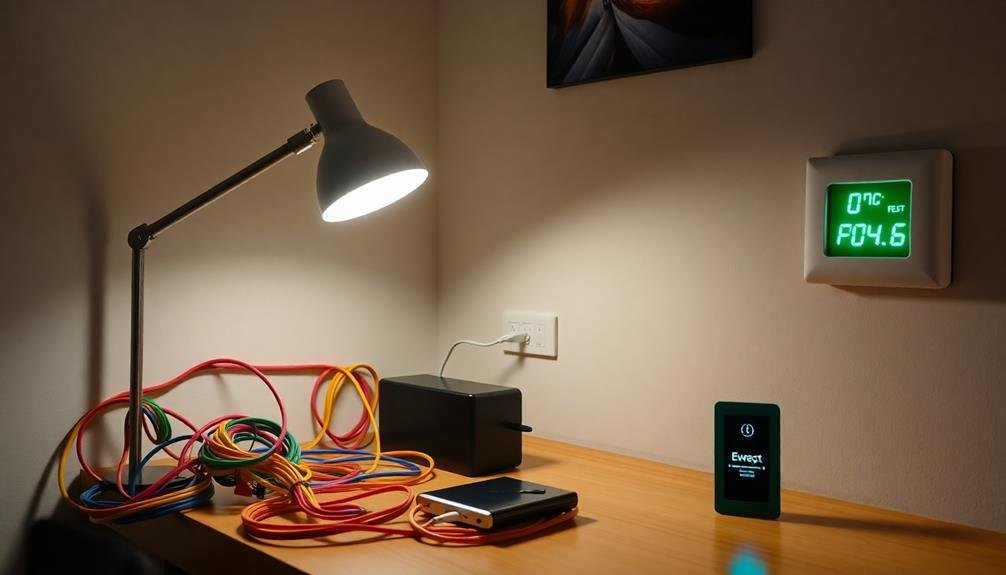

Leave a Reply